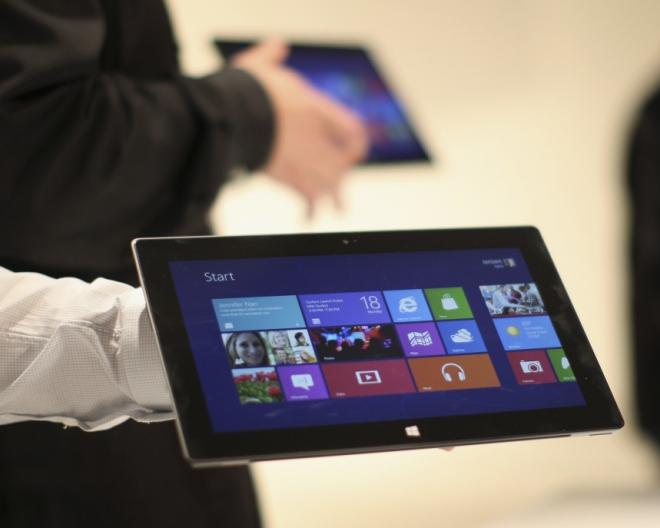
San Francisco, Jan 17: Personal computer makers, trying to beat back a tablet mania that's eating into their sales, are making what may be a last-ditch attempt to sway customers by mimicking the competition.
Many of the laptops to be unveiled around the world in coming months will be hybrids or "convertibles" - morphing easily between portable tablets and full-powered laptops with a keyboard, industry analysts say.
The wave of hybrids comes as Intel and Microsoft, long the twin leaders of the PC industry, prepare to report results this week and next. Wall Street is predicting flat to sluggish quarterly revenue growth for both, underscoring the plight of an industry that has struggled to innovate.
In 2013, some are hoping that will change.
With the release of Microsoft's touch-centric, re-imagined Windows 8 platform in October and more power-efficient chips from Intel, PC makers are trying to spark growth by focusing on creating slim laptops with touchscreens that convert to tablets and vice versa.
Microsoft, expanding beyond its traditional business of selling software, is expected this month to roll out a "Surface Pro" tablet compatible with legacy PC software developed over decades.
That's a major selling point for corporate customers like German business software maker SAP, which plans to buy Surface Pros for employees that want it, said SAP Chief Information Officer Oliver Bussmann.
"The hybrid model is very compelling for a lot of users," Bussmann told Reuters last week. "The iPad is not replacing the laptop. It's hard to create content. That's the niche that Microsoft is going after. The Surface can fill that gap."
Apple's iPad began chipping away at demand for laptops in 2010, an assault that accelerated with the launch of Amazon.com's Kindle Fire and other Google Android devices like Samsung Electronics' Note.
With sales of PCs falling last year for the first time since 2001, this year may usher in a renaissance in design and innovation from manufacturers who previously focused on reducing costs instead of adding new features to entice consumers.
"People used to be able to just show up at the party and do well just because the market was going up," Lisa Su, a senior vice president at Advanced Micro Devices, which competes against Intel. "It's harder now. You can't just show up at the party. You have to innovate and have something special."
At last week's Consumer Electronics Show in Las Vegas, devices on display from Intel and others underscored the PC industry's plan to bet more on convertible laptops.
Lenovo's North America President Gerry Smith told Reuters last week that over the holidays he sold out of the company's "Yoga", a laptop with a screen that flips back behind its keyboard, and the "ThinkPad Twist", another lightweight laptop with a swiveling screen.
Intel itself showed off a hybrid prototype laptop dubbed "North Cape", housed in a thin tablet screen that attaches magnetically to a low-profile keyboard. And Asus showed a hefty 18-inch, all-in-one Windows 8 PC that converts to a tablet running Google's Android operating system.
Lenovo and Asus, which have both won positive reviews for their devices in recent months, increased their PC shipments by 14 per cent and 17 per cent respectively last year, according to Gartner.
"The number of unique systems that our partners have developed for Windows has almost doubled since launch. That gives an indication of how much innovation is going into the PC market," Tami Reller, chief financial officer of Microsoft's Windows unit, told Reuters.
Finger-pointing
To be sure, hybrids with detachable or twistable screens do not yet account for a significant proportion of global PC sales, and consumers still need to be sold on their benefits.
Previous attempts by PC makers to reinvigorate the market have had limited success. Pushed by Intel, manufacturers launched a series of slimmed down laptops early last year with features popular on tablets, like solid-state memory.
They were too expensive, often at more than $1,000 apiece, and failed to arrest the PC decline.
Microsoft's Windows 8 launch in October brought touchscreen features but failed to spark a resurgence in PC sales many manufacturers had hoped for. A round of finger-pointing ensued, with PC and chip executives blaming a shortage of touchscreen components and others saying it was the manufacturers that sharply underestimated consumer demand for touch devices.
Regardless, the entire PC ecosystem is onboard for 2013. Almost half of the Windows laptops rolled out this year may have touchscreens. Of those, most will be in convertible form, according to IDC analyst David Daoud.
Further blurring the distinction between kinds of devices, about a quarter of upcoming Windows 8 gadgets will be tablets that can easily act as laptops with the help of keyboard accessories, he added.
But buyers may have to wait until the second half of the year to see many of them.
"The most likely scenario today is for the industry to have these products ready for the back-to-school season," Daoud said.







Comments
Add new comment